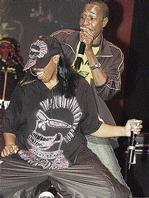Krista Henry, Staff Reporter

Tony Matterhorn performing along with rapper Missy Elliott
during this years Red Stripe Reggae Sumfest Festival. - Claudine Housen Staff/photographer
Overseas labels are knocking on dancehall's doors. In the early 1990s reggae hit the top with United States recording companies, but after a while the buzz fizzled - until recently, as more and more dancehall acts have been scouted out.
In the early 1990s Shabba Ranks took dancehall to U.S. audiences on a whole new level. Record companies began to see potential in local acts after Shabba and Maxi Priest had got through to the U.S, audience with House Call.
Several acts got signed to big labels, including Super Cat, Diana King, Tony Rebel, Tiger and Cobra, who were affiliated with Columbia Records. Barrington Levy and Morgan Heritage were signed to MCA for a short time, while Ini Kamoze, Ziggy Marley and the Melody Makers and Beres Hammond had a time with Electra. Terror Fabulous and Nadine Sutherland were with East West, while Inner Circle and Dawn Penn were signed to Big Beat. Virgin signed Shaggy and Maxi Priest. Stitchie was with Atlantic and Capleton was signed to Def Jam.
One by one or all in a bundle, most were dismissed, Shaggy being the only one to retain big label backing.
However, many years later U.S. record companies have once again returned to 'yard' grounds. Among the artistes on major labels are Shaggy (MCA) and Beenie Man (Virgin) and Baby Cham (Atlantic). Junior Gong is distributed by Universal and Elephant Man is headed to Bad Boy Records. Among the others with big label linkages are Wayne Wonder (Atlantic), Sean Paul (VP/Atlantic) and Tami Chynn (Universal Records).
And if the recent feud between VP records and Atlantic Records over the 'Man from Mars' Tony Matterhorn is any indication, dancehall is big news.
This time around, however, dancehall may hopefully bear a more sustained crop, as the continued success of Sean Paul has proven that dancehall does have a listening ear in the U.S. crowds.
Songstress Tami Chynn has been signed to Universal for a year and a half and is set to release her album soon. She is one of the many artistes who have chosen to go the route of overseas record labels. "It's the next step in my career. I want to take it internationally, so I need a company to distribute worldwide. International labels are the safe way to go. It doesn't mean that your're gonna be a success or that it's going to happen right away, but you have a much broader audience," she said.
"People's expectations are high. People are always like 'Tami, when are you gonna buss?', but I'm laying my groundwork first. I don't put all my faith in the label. I have a very good team and we have been working very hard," Chynn said.
Bigger may be better when it comes to record labels, as it takes money to make money. Producer and manager of Sean Paul, Jeremy Harding, says "we have a major label framework with which we can influence, manipulate the music further. You get bigger budgets to do music videos, to go on the road and promo, touring. We have to guide them on how to market it. they know who to market rap, rock to, they have a formula. They don't know the formula for dancehall in part due to the erratic form of the artistes, where to put them, how to use them".
Just because an artiste is signed to an international label doesn't mean instant success, or even success at all, as there are numerous drawbacks. Record labels are always eager to make the decisions for the artiste and, being from a foreign culture, their decisions may not be best for a Jamaican artiste. "All of a sudden there are lots of people to answer to. People who think you have to wear this, sound like this or that. They might want you to hook up with certain producers. Those things come up," Chynn said.
According to Harding, one should never let the label dictate terms. "They don't understand the music, lyrically and so on. The executive's first idea is to get a guest artiste to rap, 'cause rap is mainstream. It dilutes the music, especially if it's a ridiculous combination. They are not trying to maintain a core presence, they don't allow the artiste to choose songs, which remixes, which events to perform at, not perform at. For example, reggae does well on the East Coast (New York, Miami); every dancehall record radio stations play them. Yet some labels might have a link in Los Angeles and say 'OK, let's play it there' and it ends up bombing," Harding said.
Chynn says in assessing if an overseas label is better than a local one, it "depends on what you want from your music. We are making strides locally, but we have a long way to go. Internationally they have been doing it for a while". However, according to Harding, internationally one has to be on a major label, because the label has muscle and you can't reach far without it".
Perhaps the best marketing possible of Jamaican music, regardless of a record label, is unity among local artistes. If all the artistes worked together to present a united force in dancehall as a major genre, then the music could reach further. "There needs to be unity. You have too many little camps of people who do well and can't do well. At a point hip-hop had to unify, show a sense of unity. To sustain the genre we have to prove it's a valid art form. We are not trying to recognise it as a dominant form of music, 'cause it doesn't stay popular," Harding said.

